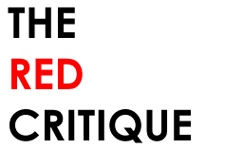
Righting the Left
Amrohini Sahay
4
Contesting the Empire-al Imaginary: The Truth of Democracy as Class
Stephen Tumino
Global AIDS and the Imperialist State: The Ends of Bourgeois Moralism
Julie Torrant
Whither Borders?
Kimberly DeFazio
Review: Mirroring Evil: Nazi Imagery/Recent Art
Jennifer Cotter
TEXT AND CLASS
D'Souza and the Narcosis of Historical Consciousness
Mas'ud Zavarzadeh
Judith Butler's "Guantánamo Bay":
A Marxist Critique
Rob Wilkie
The rigorous non-compromising shallowness of Michael Bérubé's account of the "left" ("Ali vs. Hitchens: Battle on the Left", The Chronicle of Higher Education, May 3, 2002) becomes quickly clear when one compares it with another account of the left published almost simultaneously with his.
In the May issue of The Monthly Review, Gregory Albo writes that "An assessment of the left today must begin with an analysis of neoliberalism". In other words, "left" is not simply a cultural position, as Bérubé's anecdotal and humorous, "lite" account implies. Rather, it is above all an understanding that it is the relation of capital and labor that is determining of the widening socioeconomic inequality among people. By turning the concept of "left" into a purely cultural matter, Bérubé manages to avoid all discussions of class and therefore of the logic of the "determination" of economic inequality. The erasure of the economic by the cultural is of course a familiar liberal strategy for substituting an empty descriptivism for any discussion of causality which analytically grasps the roots of social relations. Yet Bérubé's anecdotes of the left not only do the work of capital by representing the existing social space of capitalism as a flatland in which nothing is determined by anything and everything is free-floating. They also, by recourse to the "funny" as the privileged frame of reading the social, evacuate the space for any serious discussion of the place of the "left" in struggles for economic change. The "fun" in Bérubé's text is, in other words, that it provides an evasive strategy for liberals to simultaneously "talk" and "untalk" "left".
The significance of Bérubé's performance of culturalism—offered in a "savvy" literary register—becomes clear when one sees that it is also the main way free-marketeers such as Hayek and others also construct the social space—in terms of free, non-hierarchical localities of free interactions among equals in the market. The logic of both is the same: the conversion of class (the place of the subject in the economic relations of capitalist production) into culture, so as to shift the emphasis from the fundamental exploitative structure of the production relations—the root structure of inequality—to questions of "income" (one's place in the relations of consumption), that is, to the secondary ways in which the profits based on exploited social labor are "distributed". The "free" in Hayek as well as in Bérubé refers merely to cultural equality, that is, the freedom of consumption based on "income" which negates the struggle for economic freedom—freedom from exploitation and inequality.
To make my point clearer, Bérubé is, of course, a symptom: his anecdotes that moderate "left" into a vacuous culturalism point to a larger tendency (which receives wide circulation through the complicity of mainstream publications such as The Chronicle and others) to substitute the clichés of a "clash of civilizations" for substantive social analysis and consequently to right the left so that radical leftists who are struggling for global economic equality are seen by the mainstream as voices of extremism and opportunists like himself then become representative of the "acceptable" left who frequent conferences, make a fortune on lecture circuits, and are entertained in the "bacchanal of loquacious leftists".
Cynicism (covered up as irony) drips from each one of Bérubé's sentences in order to trivialize the left: "Not because I supported Nader, but because I wanted to see the Green Party hold a national convention, so I could watch the vegan-macrobiotic wing and the Mumia Abu-Jamal wing tear each other apart over health benefits for same-sex partners or replacement workers or some such thing". For Bérubé "Left" is pure entertainment. He is too savvy to believe in anything. It is simply part of his cynical amusement that he picks up Tariq Ali and Christopher Hitchens, neither of whom are by any serious definition of the term "leftists". They are liberals whose ideas, depending on whom they are dealing with, move over a wide range of political and economic positions. Even Bérubé himself recognizes this opportunistic eclecticism when he refers to Ali as having a "surfeit of principles". Focusing on them allows Bérubé to divert the serious debates on the left to trivial personal quarrels (staged by their agents no doubt) and thus participate in the silencing of the voices of the radical left.